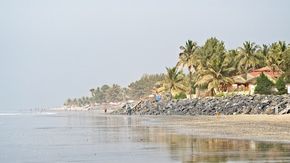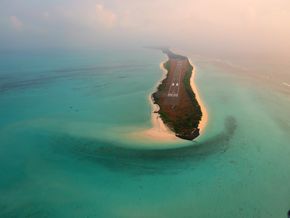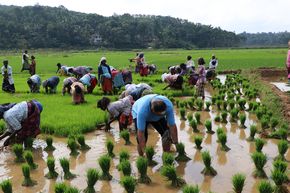Thanks to tourism the island nation of Cape Verde has become a "middle-income-country". Although the former Portuguese colony ranks low on this list, it has a high average income, low infant mortality and high life expectancy compared to its African neighbours. Where the travel sector was long seen as a saviour, however, dependence is now the country's downfall. Extending the economy to all nine inhabited islands could help the country out of its misery - but first there are problems to be solved in domestic transport.
Dependence on tourism: entire economy suffers from travel restrictions
Like many small island states with beautiful sandy beaches and warm temperatures all year round, Cape Verde has staked everything on tourism for its economic prosperity. Until the pandemic, the country did well with the travel business, providing 40 per cent of formal jobs and contributing 26 per cent to the gross domestic product. Now the holiday paradise off the coast of West Africa is showing how quickly such a one-sided economy can collapse. The GDP fell by 15 percent in the pandemic year 2020, driven by direct revenue losses in tourism but also in dependent sectors of the economy. After all, not only hotels and tour operators were affected by the travel restrictions and the slump in international arrivals since the outbreak of the coronavirus. There was hardly any need for taxis, the shops were empty and there were only few customers left at the markets in the city. The strong dependence of other economic sectors on tourism is both a curse and a blessing. When tourism is doing well, the income is spread over many shoulders. When there is a slump, everyone suffers.
Building a strong, independent economy could help the country get back on its feet, but it is not that simple: the island state struggles with significant locational disadvantages. Cape Verde has hardly any natural resources, its nine inhabitable islands are remote and isolated from the African mainland, some are threatened by active volcanoes, and agriculture is only possible to a limited extent due to the dry climate. The demand of the economic advisor Carlitos Fortes of the bank Banco Caboverdiano de Negócios to concentrate more on fishing can only be implemented to a limited extent, as it is difficult to moor the boats on the steep coasts. Scaling up fishing is therefore hardly possible. Instead, the fishermen in particular are struggling with the slump in tourism. Without guests, restaurants and traders no longer buy their catch.
Half-baked plans for decentralization
The government of Cape Verde now plans to decentralize the touristic offers. On the one hand, this can reduce social and economic inequalities between the islands of the country. On the other hand, the strong dependence of the islands Sal and Boavista on tourism could be defused. Cabo Verde Empresas expresses concerns about the government's infrastructure plans in an interview with the Cape Verdean tourism newspaper TuriMagazine in August 2022. The association for small and medium-sized enterprises on Cape Verde represents members from the tourism sector, but also from the retail sector as well as companies from completely different branches, such as the software and financial sector. While the association welcomes the plan to expand the touristic offer to all nine inhabitable islands, it criticizes that the current strategy is not feasible under the current circumstances. The inland transport is to blame. It is poorly organised and too expensive. Even though most tourists come from outside the country, domestic transport plays a decisive role for international guests as well. Tour operators, for example, cannot plan investments on other islands than Sal and Boavista, because they feel transport is not reliable. As a result of raising transport costs, tourists were already cancelling their bookings this summer. This was a blow to the local economy, which had been delighted about the return of travellers.
Domestic transport crucial for diversification
The basis for tourism development outside the islands of Sal and Boavista is functioning mobility and reliable transport routes. This also applies to the country's industrial and economic development outside the travel sector. Traders must be able to deliver their goods to any point in the archipelago within 24 hours. This is the only way they can be competitive at national level, regardless their production site on the islands. Currently, the economic isolation of some islands is making them increasingly dependent on imports. Cabo Verde Empresas is therefore calling on the Cape Verde Ministry of Transport to regulate the market and establish reliable and affordable inter-island connections.
A matter of freedom of movement
Domestic transport in Cape Verde is not only an economic, but above all a social issue, Cabo Verde Empresas warns. If the prices for air transport are above the minimum wage and sea transport is so burdensome that not everyone can use it because of their age or state of health, the state is neglecting its duties towards the population. In August, for example, there was a medical emergency on the island of Brava. The only way to evacuate the injured person was by private boat, which unfortunately broke down. There was no alternative emergency transport and the evacuation ended in tragedy. Examples like this show that freedom of movement cannot always be guaranteed on Cape Verde, says the association. An expansion of the infrastructure on the islands is therefore not only indispensable for the economy and guests, but also for the living conditions of the locals.


![[Translate to english:] Fischerboote](/fileadmin/tourismwatch/_processed_/0/c/csm_andreea-munteanu-xc_bp_SyhEI-unsplash_5d8d6502e6.jpg)



